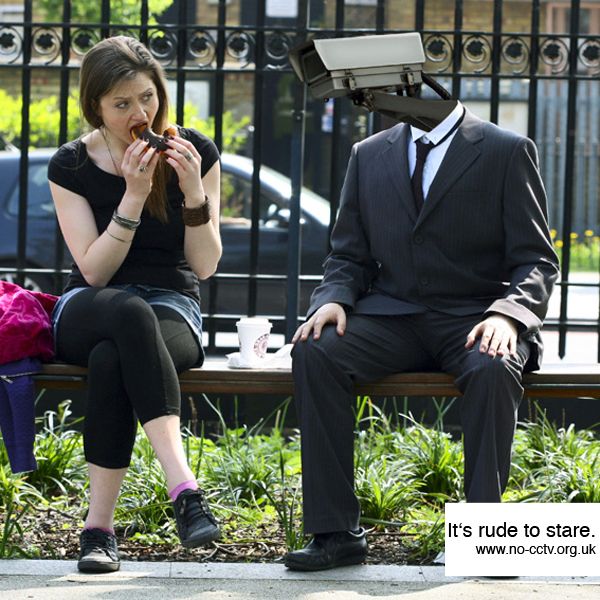IGF board member Beatrice Stude is currently in the UK and brings back insights that can also be applied to the cycling situation in Austria and Vienna. Today the fifths part of “Lessons from Britain”:
For most of us, reclaiming the streets is usually associated with ridding them of cars, making them usable and liveable again for everyone. A noble goal worth fighting for. Unfortunately, this is usually a never-ending struggle that makes one easily forget that liveable streets should also remain unsurveilled and belong in public ownership. Otherwise, even the absence of cars, and consequently pollution and noise, would not necessarily make them linger-friendly places where everyone feels welcome and that promote public life, which in particular includes freedom of speech and demonstrations.
In Austria, too, there are now tendencies to monitor public space, the reasons for which are usually similar – prevention of crime through deterrence. A look at Great Britain shows what these measures achieve: NOTHING. They cost a lot of money and in the worst case have the opposite effect. Stirring up fear and insecurity benefits certain groups, but certainly not the general public.
The surveillance of public space in the UK
‘Every breath you take, every move you make … I’ll be watching you’ by Police is probably still familiar to many. But if you mention George Orwell’s book ‘1984’ in the same breath, the song lines take on a completely different meaning – both British or from a British colony. And then you find yourself in discussions with parents in London these days who are thinking about cameras in the children’s room: out of convenience – completely ignoring the children’s right to privacy. The question quickly arises whether a certain worrying habituation effect might have set in here. After all, the UK is by far the European country that uses the most cameras to surveil public space.
1987 first deployment
It all began in 1987 when the first network of CCTV cameras was deployed in King’s Lynn in West Norfolk, about 160 kilometres north-north-east of London. In a Britain that at the time was a frequent target of terrorist attacks, starting with the IRA and followed by various threats, CCTV cameras spread across the country like a flu epidemic. As a result, even petty crimes should no longer be a problem. With an estimated 1.85 to 4.2 million cameras spread across the country, depending on which source you want to quote. This should make the UK the safest country in Europe, but it is not.
Over the last two decades, there have been many studies and evaluations on the usefulness of surveillance cameras. Proponents were desperate for proof of the positive effect of surveillance they promised: the deterrent effect on crime of all kinds, as between 2000 and 2006 alone more than £500 million had been spent on surveillance, the equivalent of about €625 million. However, research and studies by renowned universities and organisations do not confirm these promises, but show a contrary effect. Just to name a few:
- 1999 “This study provides no evidence of deterrent effect” and “CCTV cameras may even undermine social control in cities and communities … resulting in further social disruption leading to further alienation and even more crime” were the conclusions of the Universities of Wales and Newcastle
- In 2005, the University of Leicester found that “… in most cases, CCTV cameras have not reduced crime and have not made people feel safer.”
- 2007 “The Cambridge evaluation is consistent with previous research in that it fails to show any of the desired effects of CCTV cameras on town centres.“
- and in 2008 “…mounting evidence shows that private security and CCTV cameras do not reduce the fear of crime, nor crime itself, but could lead to an increase in crime” concludes the Joseph Rowntree Foundation, similar to the résumé of All Souls College, Oxford: “Britain is in danger of becoming a society in which every person is on probation!“
Cameras cannot intervene
Advocates of CCTV may now argue that CCTV footage is currently helping to condemn rioters and looters involved in last summer’s riots in the UK. However, it is believed that the flawed response of the Metropolitan Police was responsible for the spread of the rioting. Basically, the police did not have enough well-trained officers to respond quickly and appropriately. Who needs CCTV cameras when crimes could have been prevented by spending the money on more police officers instead of cameras?
A “good” example of how the vicious circle works is Liverpool. Almost two decades ago, the murder of a two-year-old child was caught on CCTV, went viral across the country and manifested Liverpool’s reputation as one of the most dangerous places – until today. Although Liverpool now has a new city centre, essentially a large private shopping mall, as well as more cameras per inhabitant than any other city in the country, the dangerous reputation has not yet been overcome. However, if you look at the statistics, Liverpool’s crime rate is much lower than Manchester’s, for example. So one could assume that the politicians, investors and the media have done their part and let the whole world believe in the high crime rate and thus give everyone a rather unsafe feeling.
More inequality, more fear
A privately owned city centre tends to welcome only wealthy customers. Anyone who is different, especially groups of young people and older people, may quickly feel some discomfort and stay away. With the result that people get used to being surrounded only by the like-minded and the equal and would easily be frightened by others. This development will lead to more inequality and fear than anything else. It is a business model that pays off for the owners but has a negative effect on society.
Cyclists in particular are still not perceived as valued customers, as priority has so far mostly been given to the supposedly more financially strong car-driving clientele: Car parking spaces in shopping streets, instead of bicycle parking spaces and space for cycling. Even in those parts of the city where pedestrian traffic is given priority, cycling is often locked out with car traffic. The plans for Mariahilfer Straße in Vienna could be a desirable exception here.
Public space belongs to all of us
In summary, it is not proven that camera surveillance in public spaces has a deterrent effect on crime, and may even encourage it. The public call for more security and consequently surveillance is followed by the privatisation of public space with the promise that the private sector will take care of everything. However, nothing comes for free. Those who own the spaces also largely determine their rules and use, and if they are private, their motives are usually profit and not the well-being of society as a whole. Public space belongs to the general public and should not be given away on the basis of questionable arguments, not even in times of general budget shortages.
IG Fahrrad became Radlobby Wien.
More Lessons from Britain
- #1 – I vote with my bike
- #2 – Love London, Go Dutch
- #3 – Boris Bikes move London
- #4 – Cycle Superhighways
- #6 – Cycleparadise Oxford



